Eat at Club Street Laundry, soak up Average Service: Restaurant names get tongue-in-cheek twists
Sign up now: Weekly recommendations for the best eats in town

In a city crowded with restaurants, owners are picking unusual names to stand out from the crowd.
PHOTOS: CLUB STREET LAUNDRY/HUP SAN SOCIAL CLUB, SOUTH & EAST, HEY KEE, KOWBOY SINGAPORE
Follow topic:
SINGAPORE – You rock up to a new cafe. It is called Average Service. Maybe you smile at the name. Then, perhaps, you wonder: Is the name a promise or a threat?
Gorgeous interiors, good music and Instagrammable food are not enough. In Singapore’s tough restaurant scene, owners are looking for buzz, for people to talk about their latest ventures.
More than 3,000 new restaurants open every year – it was 3,790 in 2024 – so it helps to stick out, and to stick in people’s heads. This is especially since 3,047 food businesses shuttered in 2024.
Enter the unusual restaurant name. Some recent ones include Club Street Laundry and its speakeasy bar Hup San Social Club; French bistro-bar Pulsii in Tras Street; burger takeaway place Kowboy in Bali Lane; South & East, a restaurant in Kent Ridge Drive; chia seed pudding cafe Chia Puddies in Clarke Quay Central; two restaurants serving Hong Kong-style food – Hey Kee in Guillemard Road and Lo Hey HK Seafood at One Holland Village; and the aforementioned Average Service in Jalan Besar.
Location, location, location
Nobody in his or her right mind would turn up at Club Street Laundry – cafe by day, modern-Australian restaurant by night – with a bag of dirty clothes. It just sounds like a tongue-in-cheek restaurant name.
Except that the four partners in this 28-seat venue, and the adjoining 11-seat speakeasy bar Hup San Social Club, have a compelling reason for choosing these names. It has to do with the location.
Club Street was home to many Chinese clubs in the 19th century, including Ee Hoe Hean Club and Goh Loo Club. These were where Chinese immigrants would gather for leisure and business.
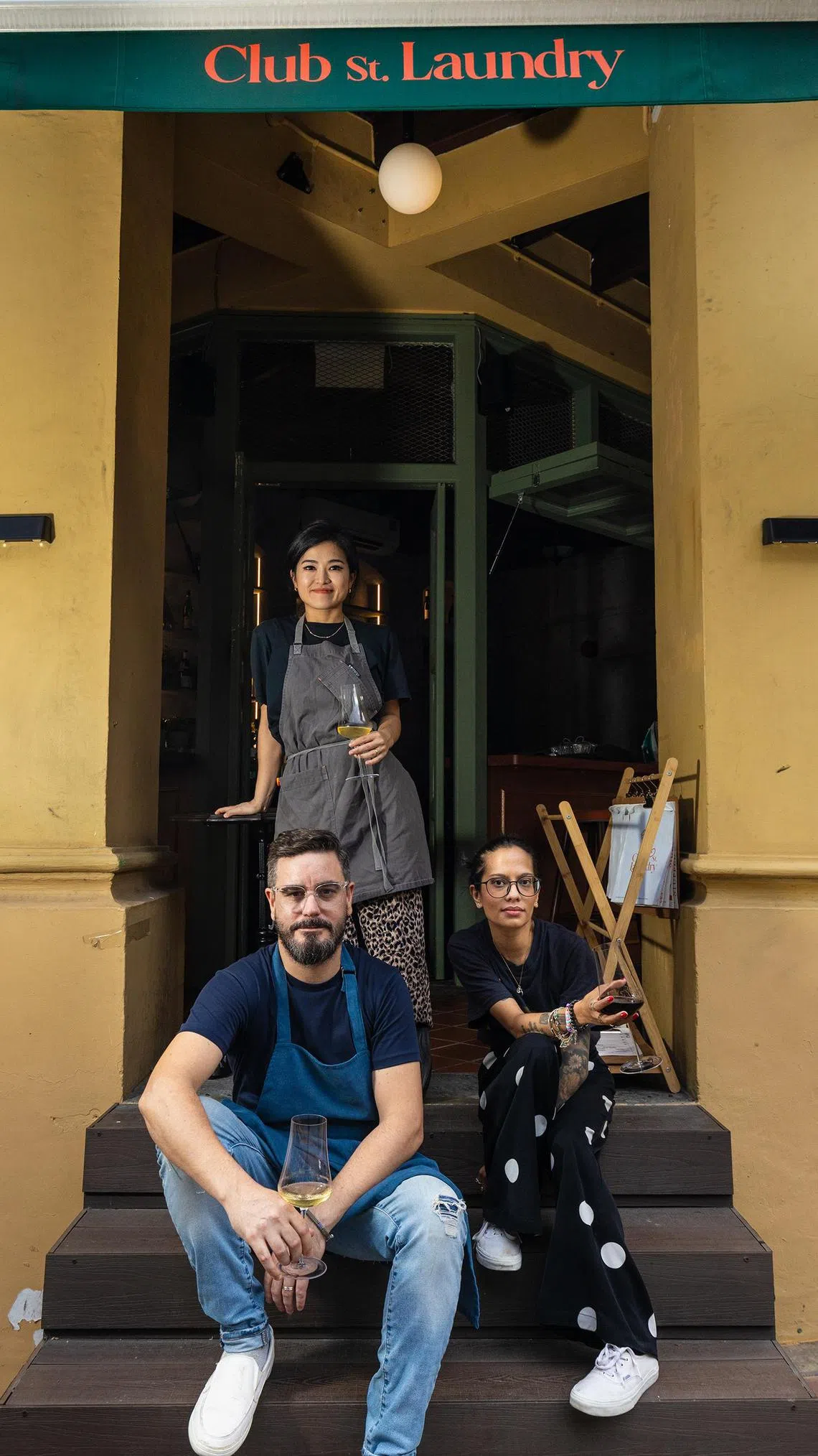
Three of the four partners behind Club Street Laundry and Hup San Social Club – (from left) chef Justin Hammond, Ms June Baek and Ms Donna-Mae de Cruz.
PHOTO: CLUB STREET LAUNDRY/HUP SAN SOCIAL CLUB
Chef Justin Hammond, 44, one of the partners, says of the research they did: “We wanted to pay homage to what was here before. Back in the 1930s and 1940s, this building housed one of two laundries in Club Street. Hup San was the name of the laundry.”
So, they named the cafe-restaurant Club Street Laundry and Hup San became the name of the bar. Both opened in January, and Ms Donna-Mae de Cruz, 37, one of the partners, says the vibe of the place harks back to those days too.
Both venues are for socialising, with coffee, sandwiches and salads in the day and comfort food at night. Offerings include Roasted Beet & Goat Cheese Salad ($15) and Flame Grilled Beef Cheeks ($30). Cocktails at Hup San are priced between $20 and $27.
The name has, of course, been a talking point. Ms de Cruz says: “People ask, ‘But why? How come?’ Once they understand the story behind it, they think it’s cool.”
Mixologist June Baek, 35, who came to Singapore from South Korea in 2018 to work, says back then, Club Street was known for its street parties. Things quietened down during the Covid-19 pandemic, but it has become buzzy again, with other new restaurants opening.
“Club Street has a lot of history with immigrants, and we are from a new generation of immigrants,” she says about herself; chef Hammond, an Australian who has lived here for 11 years; and Briton Jay Gray, 35, the fourth partner.
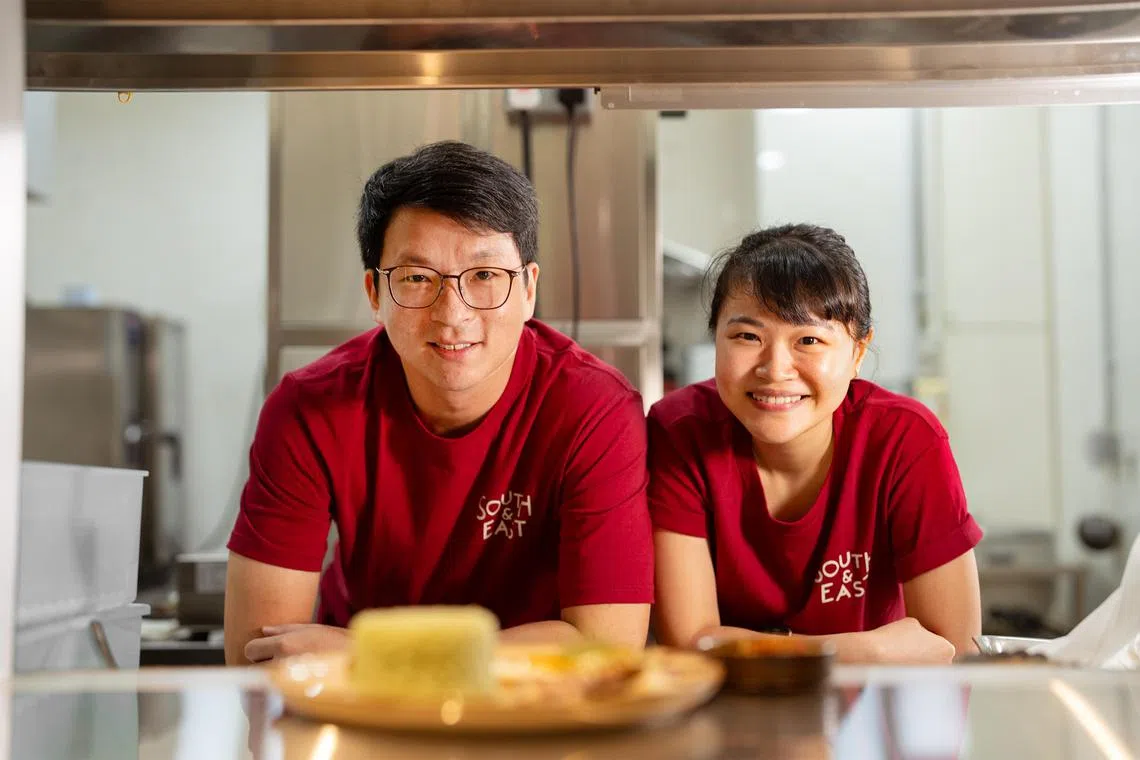
Chefs Shane Gan and Eve Wibawa of South & East.
PHOTO: SOUTH & EAST
For chefs Shane Gan, 35, and Eve Wibawa, 30, their restaurant South & East represents another sort of location. The 50-seat restaurant at Shaw Foundation Alumni House at the National University of Singapore serves food with South-east Asian flavours.
The couple, who used to run a private-dining business called South East, tweaked that name for the restaurant, which opened in October 2024. The name reflects the geographical region from which they draw inspiration for their food.
“S” and “E” are also their initials, say the graduates of At-Sunrice GlobalChef Academy. Chef Gan had worked at Cheek By Jowl and Candlenut, and chef Wibawa at Micasa Kitchen & Bar and The Naked Finn.
“When guests come in, we don’t usually say anything about the name,” says chef Wibawa, who is Indonesian. “But after they have the food, they realise why we chose it.”
Menu offerings include Babi Guling Spring Rolls ($8 for two), Black Garlic Beef Steak With Chinchalok Chimichurri ($31), Grilled Fish Fillet with Garang Asem ($25) and Pulut Hitam Cake With Coconut Jackfruit Dip ($7).
Set lunches are priced from $10.90 for Grilled Cauliflower With Jagung Bakar Sauce to $16.90 for BBQ Wagyu Beef Skewers With Marmite Glaze And Spring Onion. The set meals come with rice and two side dishes.
What began as a pop-up will morph into a permanent restaurant, they say. In June, the restaurant will close for renovation. When it reopens in August, there will be 80 to 90 seats, and a 30- to 40-seat cafe.
“We still want to keep it casual and we want to do something different,” says chef Gan, who will install a smoker as part of the renovation. The cafe, he adds, is meant to attract students, who find the set lunches a tad pricey.
Glad tidings
While geography figures in the name deliberations for some owners, others go straight for the auspicious. Hey Kee at the former Singapore Badminton Hall in Guillemard Road and Lo Hey HK Seafood at One Holland Village have just these sorts of names.
Co-founder Reuben Chua, 40, says: “We explored multiple names, but Hey Kee and Lo Hey stood out for being both catchy and meaningful. For us, a strong name must be easy to remember and carry significance.”
He opened both restaurants with business partner Keith Kang, 41, of zi char chain Yang Ming Seafood.
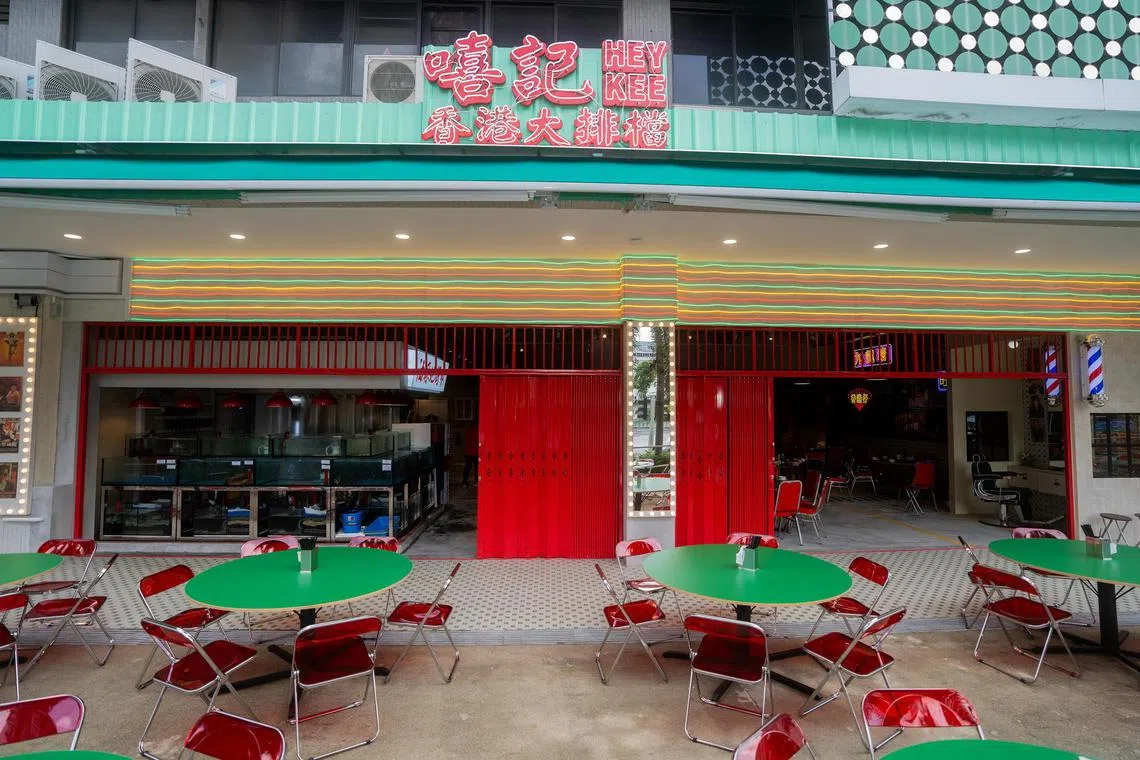
Opened in January 2024, Hey Kee in Guillemard Road serves traditional Cantonese-style food.
PHOTO: HEY KEE
In Hey Kee or “xi ji” in Mandarin, the character for “hey” combines the characters for “mouth” and “happiness”.
“The name reflects our goal to bring joy through food,” he says. “The character ‘kee’ is commonly used in Hong Kong restaurant names and means ‘to remember’. We hope diners will remember Hey Kee long after their meal.”
Lo Hey or “lao qi” in Mandarin, is about “lifting”. He says the name captures the act of lifting live seafood, which the restaurant specialises in, from the tanks at the restaurant. “It also carries a symbolic meaning, to lift up luck, a nod to prosperity and abundance,” he says.
Hey Kee, which serves traditional Cantonese-style food, opened in January 2024. On the menu are dishes such as Hair Dryer White Pepper Jumbo Prawns ($42.80), in which prawns cooked with salt and pepper are heated with a hair dryer table-side to crisp them up; and Flambe Angus Beef With Whisky ($46.80).
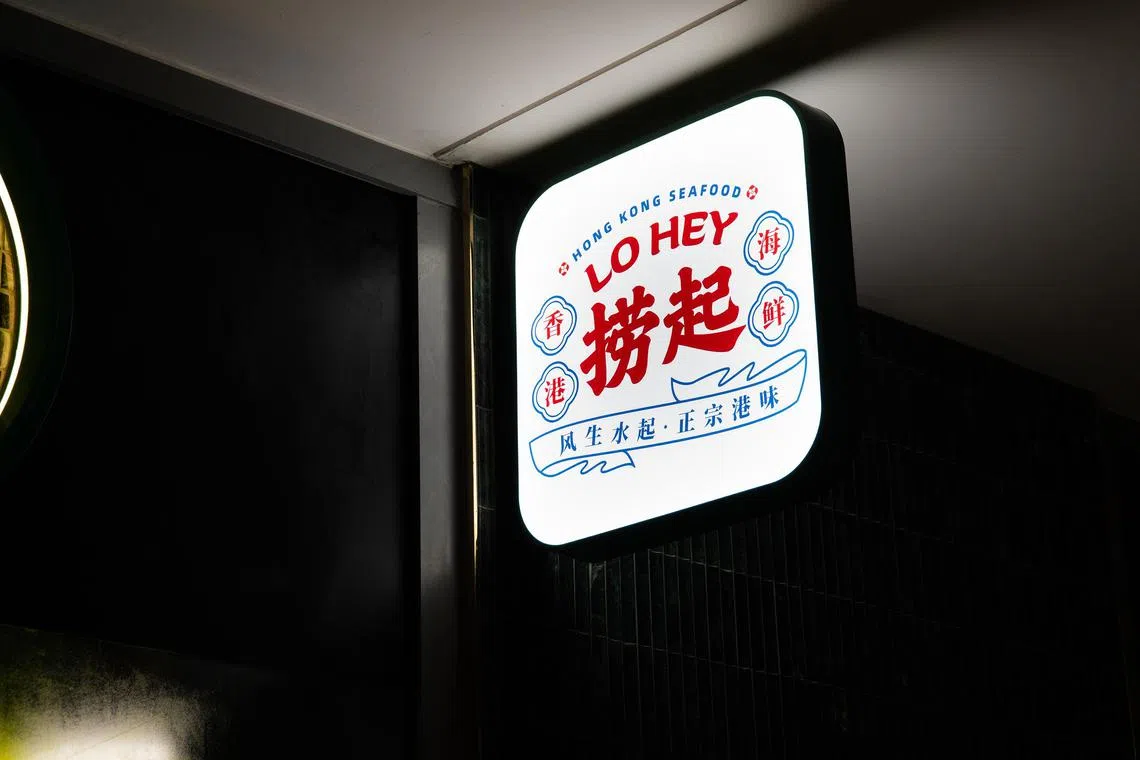
Lo Hey HK Seafood at One Holland Village.
PHOTO: LO HEY HK SEAFOOD
Lo Hey, which opened in November 2024, serves dishes such as Steamed Fish With Pickled Chilli & Kiam Chye (from $10 for 100g) and Nostalgic Braised Beef Short Ribs ($42.80).
Mr Chua says: “The names have been a great talking point. Guests are always curious about the meaning, and I enjoy sharing the inspiration behind them. It sparks interest and adds to the dining experience.”
Over in Tras Street, Pulsii is a name that chef-owner Daisuke Yoshikawa, 41, made up. He combined the word “pulse” with “ii”, which in Japanese means “good”. The restaurant, which opened in August 2024 as Pulsii Woodfire & Bar, will be renamed Pulsii French Bistro & Bar from April.
The chef, who has worked at fine-dining French restaurants in Tokyo and Ristorante Luka in Singapore, serves small plates and main dishes that showcase wood-fire cooking. Offerings include Grilled Lamb Tenderloin ($25) with baby turnip, spring onion puree, anchovies and Japanese fermented chilli oil; Brandade Croquettes ($4 each, minimum order of two); and Chicken Liver Mousse on brioche ($8 a piece, minimum order of two).
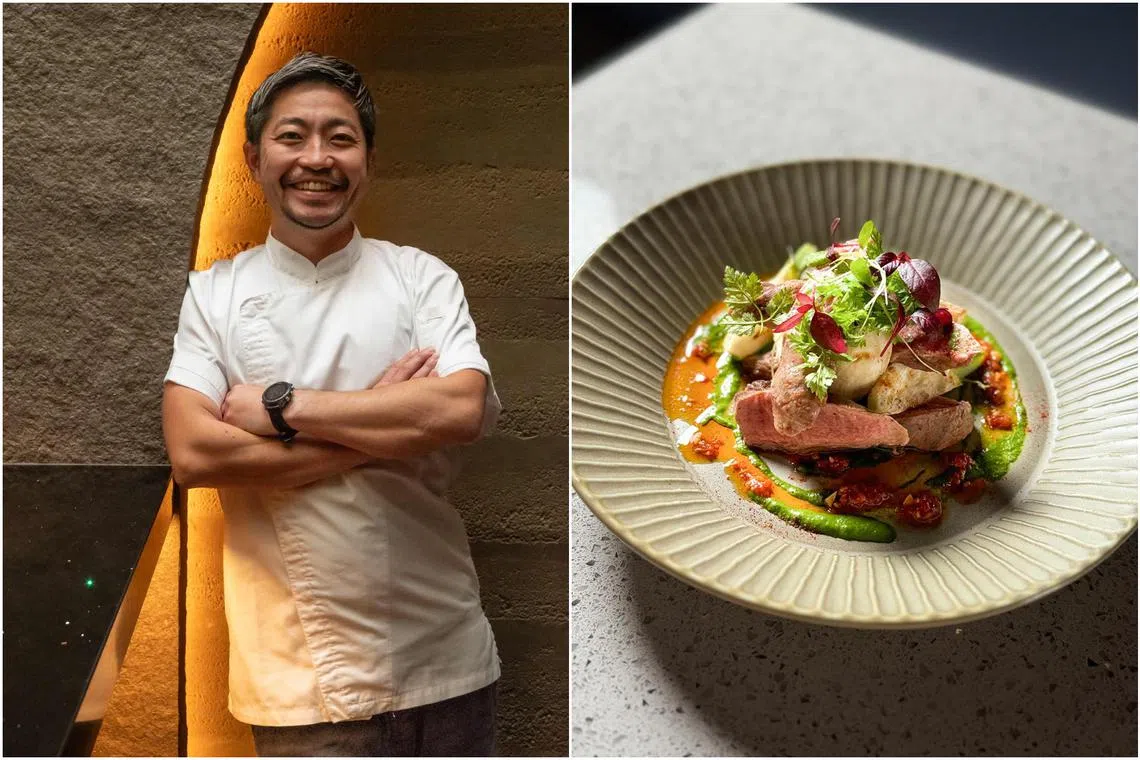
Offerings at Chef Daisuke Yoshikawa’s Pulsii French Bistro & Bar in Tras Street include Grilled Lamb Tenderloin.
PHOTOS: PULSII FRENCH BISTRO & BAR
He says of the name: “It reflects our vision of a restaurant where guests can dine with a good pulse through experiencing food that is not only delicious, but also invigorating, engaging and deeply satisfying. It’s a name that conveys warmth, dynamism and the joy of coming together over great food.
“We explored several names that reflected fire, energy and craftsmanship, but many either felt too common or didn’t fully capture our vision of Japanese ingredients, wood-fire cooking and bistro-style dining. We wanted something unique and memorable – a name that reflects the kind of experience we aim to create.”
Passing the vibe check
If Kowboy conjures up images of tough cattle-herding guys riding horses and who cannot spell, well, you would be right, but only partially. The takeaway place in Bali Lane serves cow – in the form of beef patties. But the vibe is quite different, futuristic even.
The burger patties are stuffed into pita pockets and pressed in a contraption so they emerge looking like UFOs. Customers take them away in silver bags.
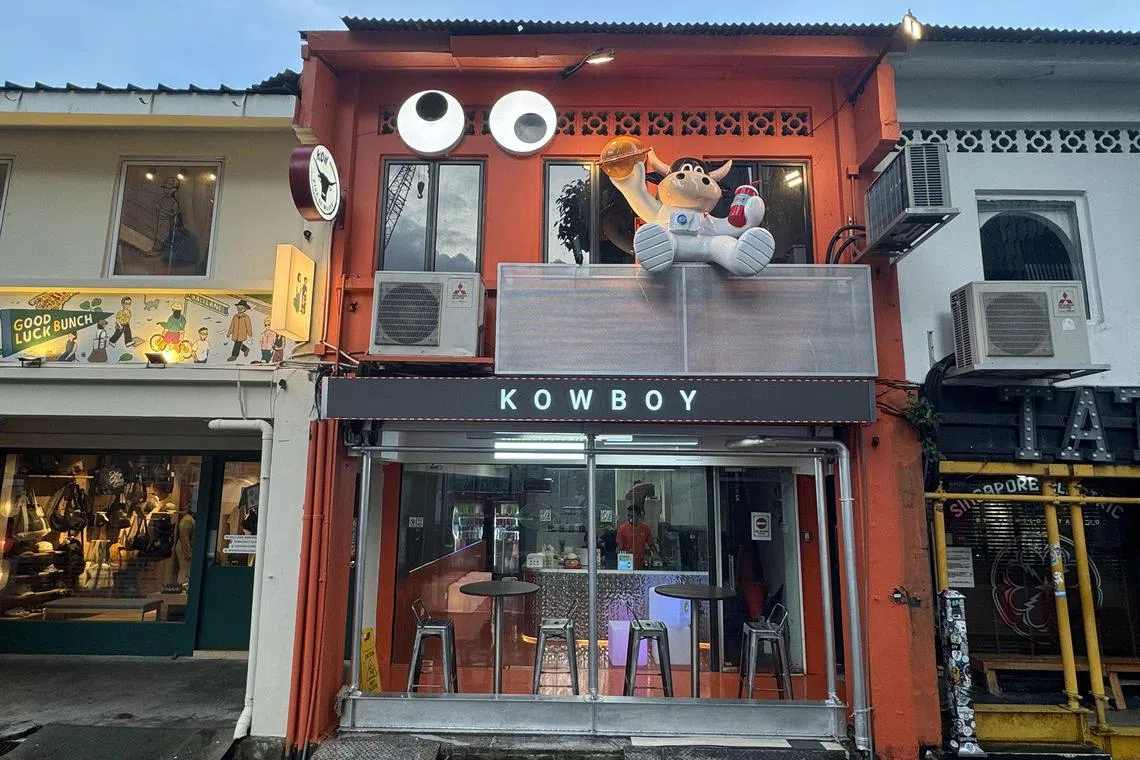
Burger takeout place Kowboy in Bali Lane.
PHOTO: KOWBOY SINGAPORE
The Kow in Kowboy is short for King Of Wagyu, says owner Michael Lee, 52. The former advertising man, who was in the business for 30 years and directed TV commercials, started King Of Wagyu, a halal beef supplier, in 2022. He had been based in China for 18 years, and came home in 2020 to visit his parents, so they could see their newborn grandson.
Covid-19 kept him in Singapore, and he thought of what he could do here.
“Dad is a meat lover,” he says. “But my mother is Buddhist, so we don’t eat beef at home. I thought, why not open a small shop and hire a chef, so he can have steak. Dad is the ‘king’ of the family and I wanted to serve wagyu. That’s how King Of Wagyu emerged.”
The halal part of the equation came from a Muslim neighbour, who lamented not being able to get halal beef from Japan easily.
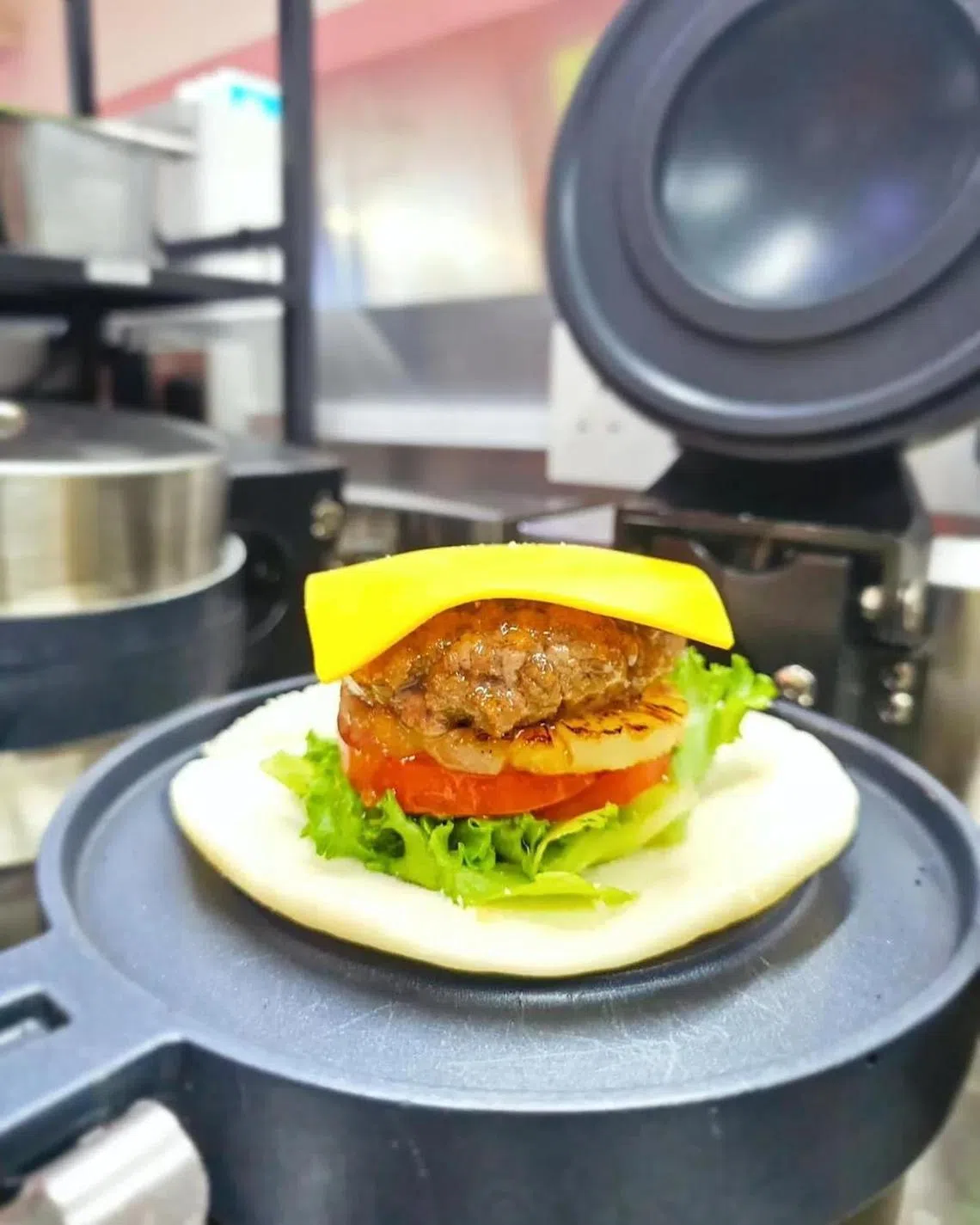
Kowboy’s burgers are pressed before being sealed.
PHOTO: KOWBOY SINGAPORE
Fast forward to 2023, and he takes over Wakuwaku Yakiniku, a halal yakiniku restaurant in Bali Lane that was among the restaurants he supplies beef to. He moves the butcher shop online, and to make sure the trimmings are used up, opens Kowboy in January 2025.
The UFO burgers are priced from $9.80 for UFO Starry Spore, stuffed with grilled mushroom, to $12.80 for UFO Supernova Mentaiko, stuffed with mentaiko chicken katsu. He also serves malted milkshakes, including Strawberry Celestia ($9.80).
Kow will soon spawn Kowgirl, Mr Lee says, adding that it will serve Hong Kong-style desserts.
Chia Puddies, a 10-seat chia seed pudding store in Clark Quay Central, opened in January. Co-owner Megan Lim, 26, says the name is a “playful twist” on chia pudding and reflects what the store sells.
Offerings include Glory Bowl, with coconut chia pudding, granola, coconut shavings, mango and strawberries; and Morning Bowl, with banana blueberry chia pudding, yogurt, almond butter, granola, banana and blueberries. These are priced at $10.50, $12.50 and $16, depending on size.
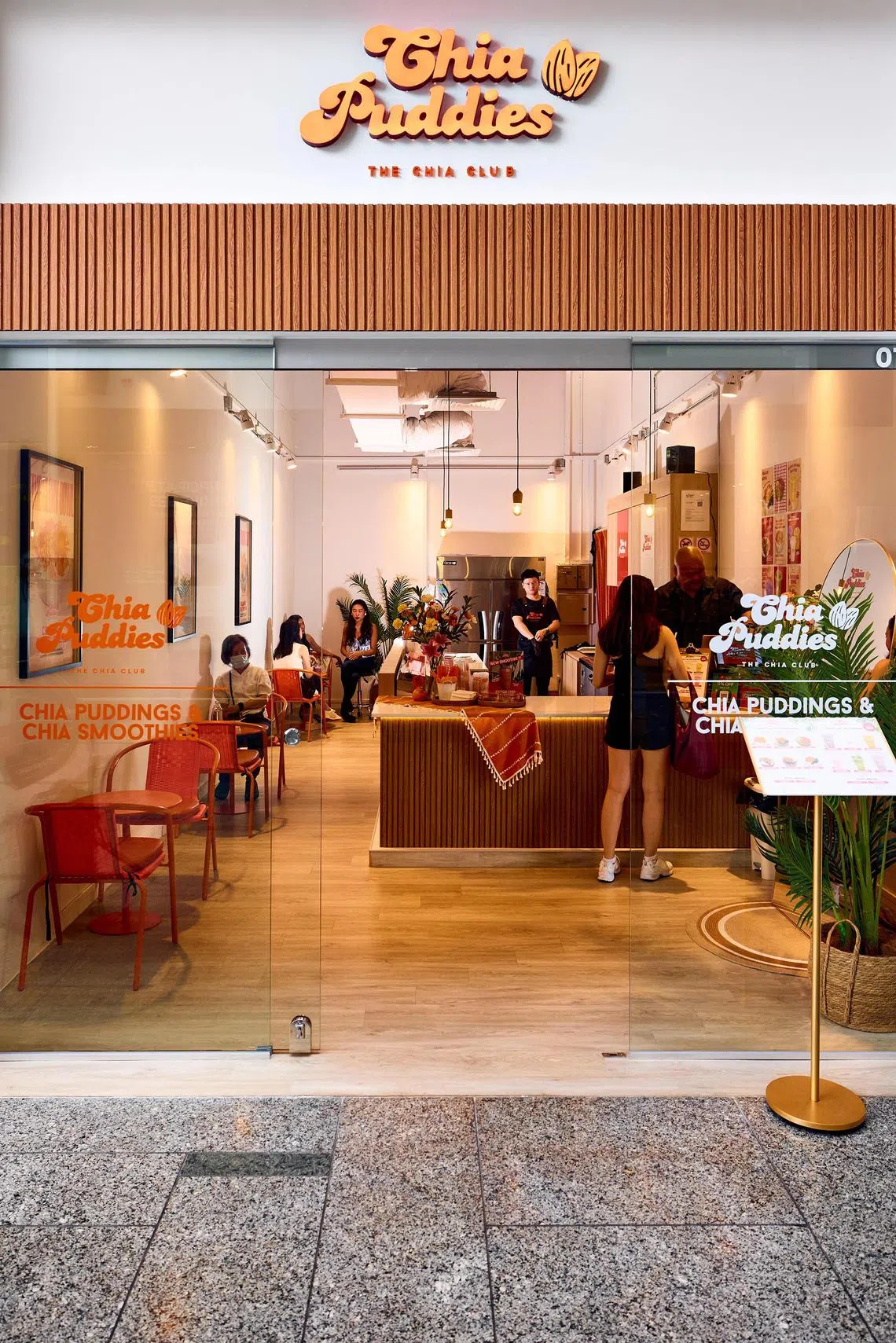
Chia pudding cafe Chia Puddies in Clarke Quay Central.
PHOTO: CHIA PUDDIES
She says: “We played around with Chia Buddies and The Chia Club, but wanted something more unique and fun that really showed off our lively brand.
“Its uniqueness helps people easily remember us, which encourages repeat visits and word-of-mouth recommendations. It’s become quite the conversation starter, with many guests asking our staff about the story behind our name.”
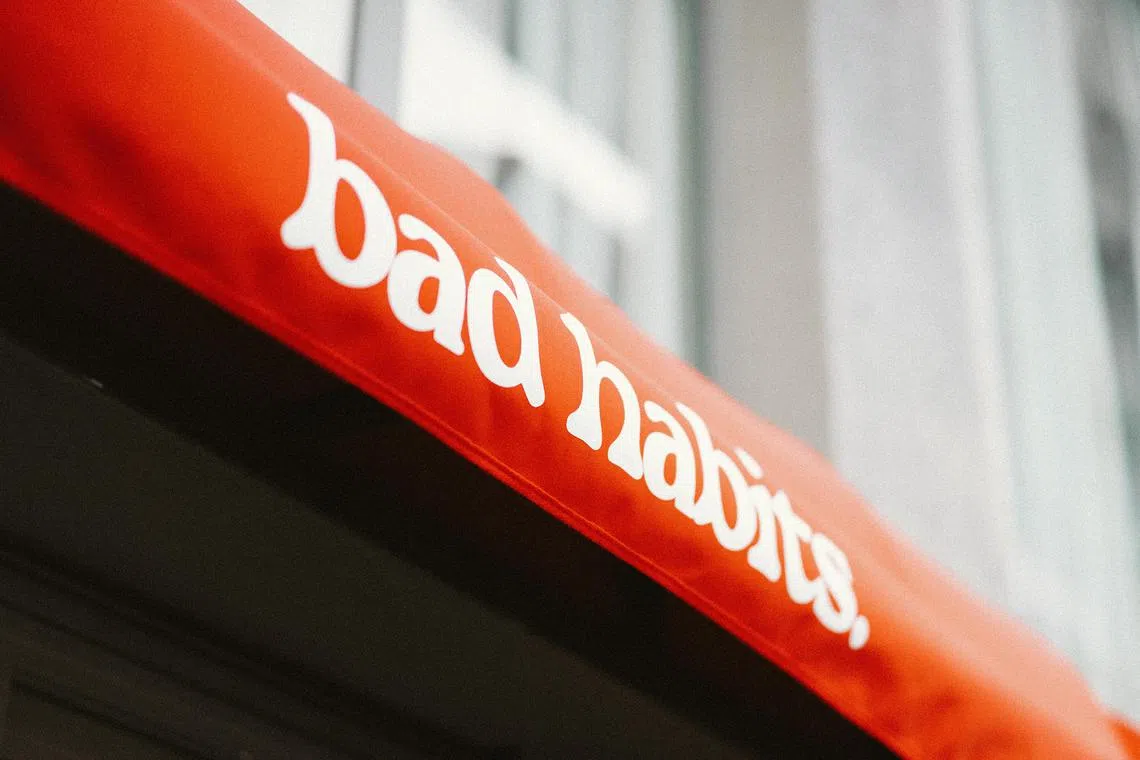
Bad Habits is a pizza place in Mohamed Sultan Road.
PHOTO: BAD HABITS
Then there is Bad Habits, a 20-seat pizza joint in Mohamed Sultan Road that opened in July 2024. It sells New York-style pizza by the slice, priced from $7.
Co-owner Angelo Tan, 32, says the owners had not considered other names for the place. “The name and concept are what we always envisioned it to be,” he says. “Did what felt right to us. I don’t think the name draws more business either. If you like what you do and have fun doing it, people will believe in your vision. I think largely why diners love the name – it’s because they embraced their bad habits.”
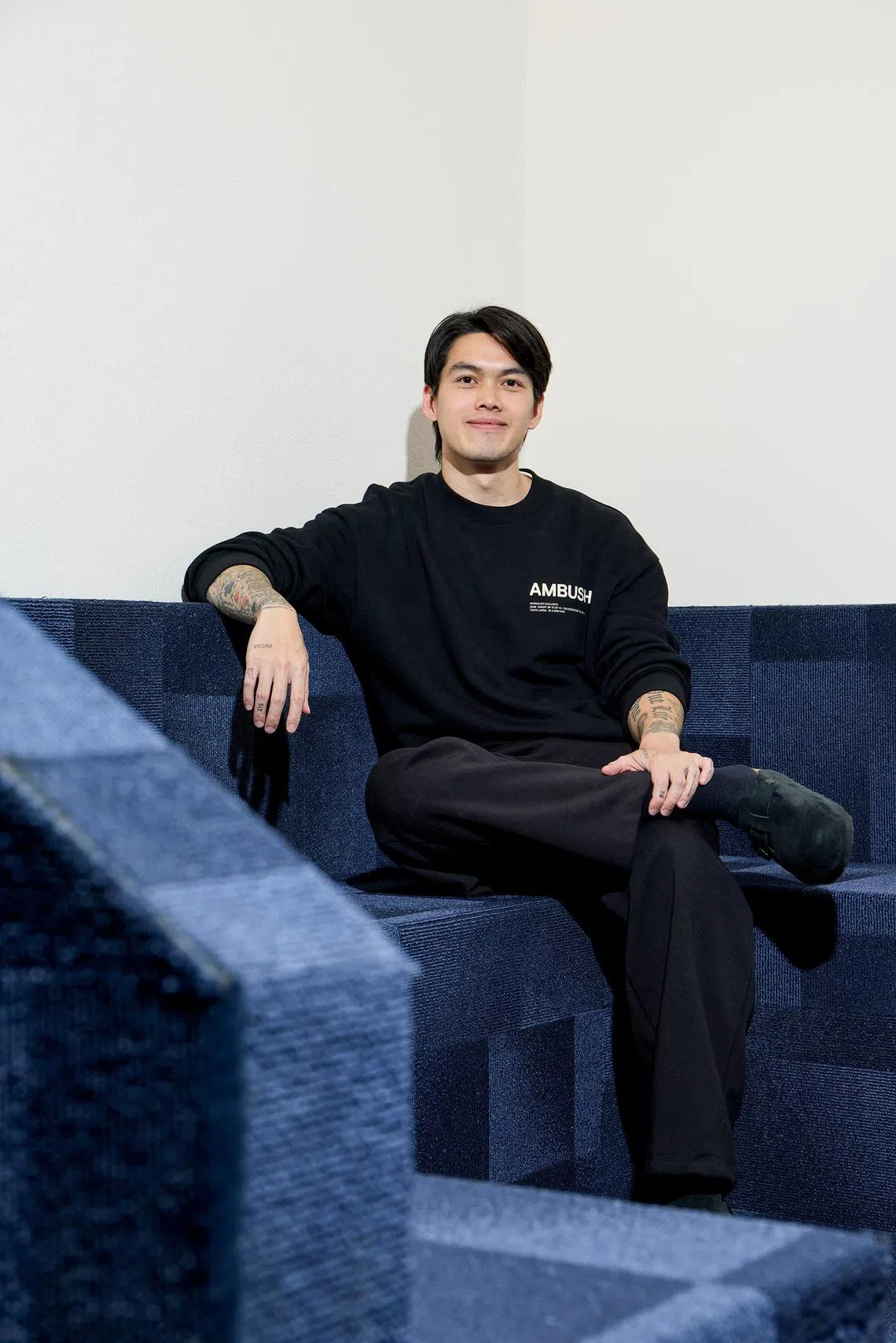
Mr Jerls Su is the owner of 80-seat Average Service in Jalan Besar.
PHOTO: AVERAGE SERVICE
Mr Jerls Su, who opened the 80-seat Average Service in Jalan Besar in January, embraces the idea of average.
“Most of our days are average,” he says. “Often, people are on autopilot. Nobody pays attention to the day to day. We want to highlight the everyday experience. We call that average times made intentional.”
The 35-year-old, who has worked as a DJ and was an F&B consultant, had considered other names that included words like “normal”, “super” and “basic”. “After digging deeper, we wanted a strong foundation for the brand,” he says.
Certainly, the name has attracted buzz. He says: “A lot of people interpret it as us offering average service. It’s a tongue-in-cheek name and that’s what we want. They’ll say, ‘Oh, actually, your service is not average’ or ‘Average Service does not have average food’.”
Part of being intentional is about paying attention to the details.
The chairs and tables are custom-made, the QR code for the menu is etched onto wooden blocks and he “went through a tonne of cups and glasses” before settling on the ones customers now drink out of.
The menu offerings look handsome on a plate and include Thick Slab Bacon ($26), a 180g piece of maple-glazed bacon on eggs and sourdough toast; Average Rice With Crispy Skin Salmon ($24); Mentai Handkerchief Pasta ($24); and Average Maple Toast ($16).
The food, he says, is inspired by his trips to Melbourne. “We wanted to offer things that are classic but with a twist. It’s Melbourne-inspired brunch food. Somewhere between boring and innovative.”
Average, perhaps?
Tan Hsueh Yun is senior food correspondent at The Straits Times. She covers all aspects of the food and beverage scene in Singapore.


